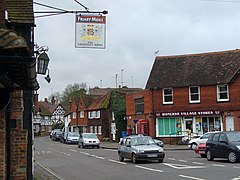Shamley Green
| Wonersh | |
|---|---|
 Part of the village and Surrey Hills AONB |
|
 Wonersh Village Stores and The Street |
|
| Wonersh shown within Surrey | |
| Area | 17.18 km2 (6.63 sq mi) |
| Population | 3,412 (Civil Parish 2011) |
| • Density | 199/km2 (520/sq mi) |
| OS grid reference | TQ016453 |
| Civil parish |
|
| District | |
| Shire county | |
| Region | |
| Country | England |
| Sovereign state | United Kingdom |
| Post town | Guildford |
| Postcode district | GU5 |
| Dialling code | 01483 |
| Police | Surrey |
| Fire | Surrey |
| Ambulance | South East Coast |
| EU Parliament | South East England |
| UK Parliament | |
Wonersh is a village and civil parish in the Waverley district of Surrey, England and Surrey Hills Area of Outstanding Natural Beauty. Wonersh contains three Conservation Areas and spans an area three to six miles SSE of Guildford. In the outer London commuter belt, the village is 28 miles (45 km) southwest of London. Wonersh's economy is predominantly a service sector economy. Three architecturally-listed churches are within its boundaries as are a number of notable homes such as Frank Cook's 1905 hilltop mansion, which is a hotel, business and wedding venue.
State records show the name as Wonherche, (14th century); Ognersh and Ignersh, (16th and 17th centuries). The form Woghenersh, in a Charter roll of 1305, indicates the (Old English) formation (aet) wogan ersce, 'at the crooked field'.
Finds have been found in the hamlet and forest of Blackheath of mesolithic (Stone Age) flint implements and near Chinthurst Hill.
Based on foundations and core of the church, a settlement has existed in Wonersh village centre since Anglo-Saxon times.
An ilex (holly) tree stood in the garden of Green Place and estimates of its age ranged up to 1200 years. This certainly appears to support the existent of an ancient settlement in the area, as the ilex is not an indigenous species.
Wonersh is not named in the Domesday Book. All the six manors: Tangley or Great Tangley; Little Tangley; Halldish; Losterford/Lostiford above the intact mill and mill house by the village; Rowleys and; Chinthurst (partly in Shalford) were later built on lands then in Bramley and Shalford. Great Tangley Manor in 1582 became the residence of John and Lettice Carrill and descended to their grandson John Carrill (d. 1656) and his widow Hester, who secondly married Sir Francis Duncombe.
...
Wikipedia

